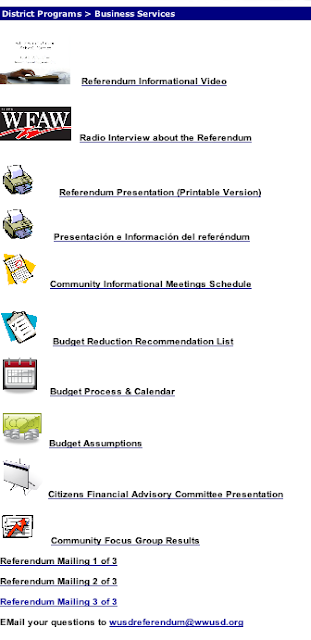Sometimes one sees something impressive. Last night was one of those times. After all but a few votes have been counted, the Whitewater Schools’ referendum has likely passed. I wrote about the referendum on January 18th, and made two principal points:
(1) the referendum faced long odds (“I’d guess that a referendum in the spring has only about a one-in-three chance of success, perhaps less, based on the likely composition of the electorate”) and
(2) the referendum might still pass, with skillful political work (“So is a referendum doomed? No, it’s not. The odds may be against a referendum, but it’s possible to change those odds”).
For the full post, see Local Politics of a Whitewater Schools Referendum.
Regardless of one’s views, it’s hard to over-estimate the political accomplishment. While other nearby districts saw referendums fail (Watertown, Parkview, it seems), Whitewater’s succeeded. I ended that post by writing that “the way to win, and even the way to get a good-enough result, is to play to win.”
[4.4.12 update: Watertown vote likely passed.]Play to win they did, in what may have been Whitewater’s most effective local campaign in years. On its own, this race deserves notice, regardless of one’s opinion of additional spending. A spring primary is the hardest time for a spending referendum, and this spring electorate (in a GOP presidential primary) made the referendum question an uphill fight. (Candidly, even if the referendum had been narrowly defeated, it would have been a political, if not practical, accomplishment to keep the race close.)
It’s unavailaling [typo corrected to] unavailing to emphasize the distribution of the vote between townships and the city: this was a district-wide vote, up or down. The referendum won where it needed to, and kept the race close enough where it trailed.
The only way to win was a direct approach, and that the Whitewater Schools certainly took: through its website, the district administrator’s many personal appearances, and a supporters’ campaign, proponents of the referendum were visible and communicative. (Embedded below is a screenshot of the district website’s informational links.) People can’t say they weren’t told about it — there was ample information on the issue. Some of this grassroots advocacy came not just from postcards, but from new media like Facebook (and probably lots of emails and text messages among supporters, etc).
A combination of presentations from District Administrator Eric Runez and grassroots advocacy from supporters made this possible. I’d guess that if either had been missing the referendum would have failed. People admire those who go out and about on behalf of a cause.
Other local campaigns should look to the referendum supporters’ efforts as a model for future races.
All in all, very well played.

